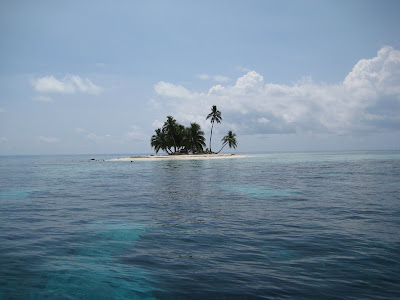From Livingston, we wanted to head to Punta Gorda, Belize, so we took a boat to Puerto Barrios, Q30 ($3.75). Livingston is between the two, but there are not many direct boats from Livingston to PG. In Puerto Barrios, we went to the Immigration Office and paid our $10 exit fee, then bought boat tickets for $25 apiece. During the short wait, we ate thick flour tortillas (it's been months!) with beef and chiles. The boat ride was lightening fast due to the calm water. Before, the trip took over an hour both times I went. This time is was 35 minutes.
The nice thing about PG is I know people there, and Sustainable Harvest lets me sleep in the office. It's not more uncomfortable than a hotel; the only thing is, someone might pop in early in the morning.
After 2 nights in PG, we took the bus to Placencia. Looking around the bus was fantastic. Every ethnic group was well represented. Halfway to Placencia, an old-style Mennonite family got on, taking a sick child to Independence, the town across from Placencia.
From Independnce we took a water taxi to Placencia ($5 US each) thorugh the mangroves. We saw some cinnamon-colored heron which I haven't had a chance to look up.
Placencia is more of a tourist town than PG, but not much. We located a tour operator that would take us to the Belizean Cayes for $70 each -- a fortune for us who think in Central American terms -- but we bit the bullet our second day there.
I have to say that was one of the best decisions of my life. I tend to dislike tourist behavior. My idea of getting to know a place is walking its streets, talking to its residents, and with luck, being invited into homes.

But the reef -- that's amazing. We zipped out 20 miles east of Placencia to Silk Caye, passing dozens of islands with homes, some humble, others grandiose; many very solitary. We saw dolphins by the dozen.

We arrived at a tiny island near the reef. The depth of the sea drops from near zero to about 3000 meters at the reef, which is home to more species of different living things than I could ever imagine. Coral, fish, sharks, turtles, rays, mollusks... I was overwhelmed.
And suburned. I didn't think about that until after 10 am.

After 2 days in Placencia, we returned to PG, took the boat to Puerto Barrios, took a bus to Guate and spent the night in the Posada Belen, a former house in Zone 1, built in the 1870s. It cost 3 times what I spent before in Guate, but, since I'd been the primary one to back out of going to Tikal, I felt a bit of a splurge was in order.
After another four hour bus ride home, I was exhausted from the travel, but wil never forget the two hours we spent in Independence the morning we left Placencia.
We had arrived at the water taxi at 5:55 am, only to learn the first one doesn't leave until 6:45. I knew we had a long bus ride to PG of an hour and a half or two hours, and that the first boat leaves PG at 9, so we were in a hurry. I thought only two boats left, 9 and 4, and that if we missed the 9, we'd have to spend the night in Puerto Barrios, known more for murder and prostitution than for tourism, though I've always thought it wasn't so bad.
Anyhow, at 7am we were at a bus stop in Independence. I asked a Mennonite watermelon slesman if he was heading towards PG. He let us know we were in for a really long wait, and that his day was going to be spent selling watermelons.
We chatted over the next two hours, and that made the time fly. He was born in Bolivia, lived in Canada for 4 years, came here 8 years ago or so. Educated me about the various different groups of Mennonites in Belize. The first ones came to southern Belize in 1996. He has five kids, doesn't use motors, speaks German better than English and his Spanish is poor.
I love the conversations in Central America. So many people have so much enthusiasm and so much to say. What should have been a huge letdown, 2 hours in the middle of nowhere, knowing we're going to miss the boat (it turned out there was one at noon, so we caught a bus to Guate), turned out to be such a positive experience.
And his watermelon, at $0.40BZ the pound, moved pretty well.










